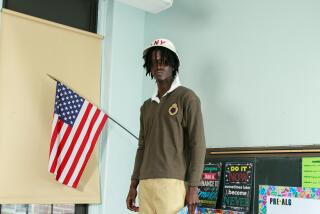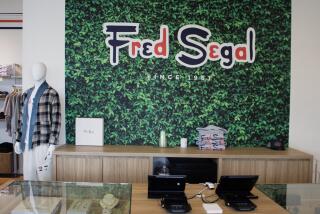What Was This Man Thinking? : Luciano Benetton’s clothes and ads work in Europe. But the ‘Zen-trepreneur’ behind a global empire just doesn’t seem to get America.
- Share via
PONZANO, Italy — A full moon nuzzles the blond villa where Luciano Benetton houses his company. The rooms are brightly lit, anticipating his return from Rome, an hour’s flight to the south.
When he finally arrives, close to 8 p.m., Benetton enters a whitewashed room, sits at the head of a vast, dark table and joins his hands on the surface. He seems benignly formal and remote, nodding politely to his press director and a translator, stopping far short of chitchat.
It is a chilly scene, perhaps understandably so. Benetton, after all, supplies 600 administrative jobs for the towns around this villa, 4,400 more worldwide. He oversees a $2-billion global company and has gone beyond it into the fiery field of Italian politics, as a senator.
If he behaves like a head of state, setting a news conference tone when a casual conversation would do, seeming to dash from one hushed meeting to another, shadowed by a hovering staff, transported by private planes and chauffeured cars, he’s entitled.
Still, it makes an American wonder whether the remote aura of the man explains his company’s loss of touch with its U.S. following.
The Benetton name is golden in Italy; it has been from the start. In 1965, Luciano Benetton was selling sweaters made by his sister, Guiliana. The business grew into a knitwear company, then a garment industry empire, with complete clothing collections for women, men and children. About 40% of sales come from Italy.
But in the United States, the company is in danger of a fate worse than failure, by fashion world standards. It is on the brink of becoming irrelevant. The label appeared here in 1979 and within five years Benetton had about 700 U.S. stores. But lately the number has plunged to less than 200.
What went wrong is easy to see, in hindsight. Overexpansion and fashion styles that failed to keep up with the tastes of teen-agers, the primary U.S. customer, presented problems. And the company’s licensing system, in which private investors own individual stores, has made it difficult for shoppers to purchase items in one spot and exchange them in another. The system works in Europe, but the company was slow to concede that it didn’t work here.
“Benetton has been very stubborn,” says New York apparel industry consultant Alan Millstein. “The attitude is that the world comes to them. They tell the world what to wear, the consumer doesn’t tell them.”
Stubborn is not the first word people who know Benetton, 58, use to describe him. But it does come up. His son Mauro says: “Ask me about my father, that is the most complicated question of all. He is a simple man who uses simple words. But you are not sure if he is saying what he means or thinking something different.
“He is always right, because he is Mr. Luciano Benetton,” says Mauro, 31, marketing director for the company’s U.S. operations.
“Luciano is a modern Medici,” says Oliviero Toscani, a longtime friend and creator of the company’s incendiary ad campaigns. “He goes on instinct. He’ll say, ‘Let’s try it.’ ”
That attitude has led to the banning of some Benetton ads in Europe. One potent image shows an AIDS patient near death. Others depict a priest and nun kissing, an infant attached to the umbilical cord and body parts rubber-stamped HIV , like cuts of beef. Nowhere do clothes appear.
Toscani says such “shock advertising” aims to evoke an emotion, not a Benetton outfit. “Luciano doesn’t ask me to sell product, he asks me to communicate.”
If Toscani sees Benetton as a Medici-like arts patron, Peter Fresola, the company’s director of communications for North America, views him as a showman: “He makes things happen, like P.T. Barnum.”
Benetton opened a store in Moscow’s Red Square soon after glasnost , in 1987. And he has moved into other territories largely untouched by European companies, among them Cuba, Korea, Argentina and the Philippines.
“We needed to find new markets,” Benetton explains simply.
Sports are another of Benetton’s passions, not one he turns to exclusively for pleasure. In the past four years, he has added 10 sporting goods firms to the company holdings, including Rollerblade skates, Prince tennis equipment and Nordica ski equipment.
“He is a Zen-trepreneur,” Fresola says, explaining Benetton’s acquisitions. “Work and play are seamless. He makes no distinction between one and the other.”
That was once apparent in his dress. When Benetton visited his first Rodeo Drive shop in 1985, his long and shaggy hair was already streaked with silver. He wore khaki pants and said his favorite U.S. label was Timberland. He looked more like a backpacking college professor than a business tycoon. Riding the youth wave, dressed for the part, Benetton had been compared to a Boy Scout by the American press.
These days, a turtleneck sweater or a blazer and tie are his style. His hair is shorter and less shaggy. But youth still seems to be an obsession. “The average age of (Benetton) employees is 30 years,” notes Marina Galanti, the company’s press director.
The administrative office, built beside the villa in Ponzano, is a high-tech chalet where informality rules. Employees hang their jackets on a coat rack near the door. A frizzle-haired bicyclist rides into the office and nobody blinks. These young employees may have little contact with Benetton, but they know his reputation as a self-made man.
He is a family man in the Italian tradition. He was born in Treviso, where his father owned a bicycle shop. Luciano built his clothing business with his brothers Carlo, now general manager for North American operations; Gilberto, vice chairman of the company; and his sister, Guiliana, who oversees the fashion collections.
Along with Mauro, another son, Alessandro, helps run the business. He is president of communications for Benetton Sportsystem, the athletic equipment division. Only Benetton’s wife, now estranged, has stayed out of it.
Luciano Benetton says he never envisioned his current life. As a boy living in this small town north of Venice, “I was to become a physician,” he recalls. But he never went to college. “There is no planning.”
It was the same when he entered the Italian senate in April, 1992. “Six months before, I hadn’t thought of it,” he says. “I was never interested in politics. But our country was in a bad situation, all Italians felt we had to do something. We couldn’t just criticize.”
At the time he stepped into his five-year term last spring, the Italian government was embroiled in a kickback scandal. Corporations had paid off public officials in exchange for construction contracts.
Government work is erratic. Senators meet in Rome three times a day or three times a month, depending on the number of bills they need to vote on. Benetton says he doesn’t plan to make a career of it: “I feel much more comfortable working in my own company.”
If he has a vision for his government, it is to make Italy’s business laws part of an international system. Promoting world harmony has long been the subtext of Benetton’s company. Its slogan, United Colors of Benetton, suggests united cultures as well. “Without an understanding of people in various cultures, everything seems meaningless,” he says.
The words sound practical and logical, not particularly high-minded. Benetton may be a dreamer, but he comes across as a doer. Yet, he has been slow to do what it takes to perform well in America.
“When Benetton started out in America, the idea was, if you make it, here you’ve made it,” Fresola says.
Now, Benetton suggests that his attitude has changed. “I am not disappointed,” he says of the store closings in recent years. “We know the myth of the U.S. and it will last. Now, though, we believe 700 stores is too many, because of the number of strong cities in the U.S. Two-hundred-fifty stores is our goal.”
“That’s garbage,” says Neil Thall, an Atlanta-based retail consultant. “America is still the largest consumer market in the world. Saying ‘I’m not interested’ (in growing) is sour grapes.”
Thall attributes the company’s drop in U.S. sales to the merchandise and the ad campaigns. “Benetton started out with a great concept and didn’t evolve. And they got very preachy.”
Others agree that Benetton missed the beat by holding tight to knit sweaters and T-shirts when that look gave way to baggy overalls and denim shirts in the mid-’80s. “The clothes had enormous snob appeal among the prep school set,” industry consultant Millstein says. “But Guess replaced them.
“People still think of Benetton as a sweater store,” he notes. “The problem with that is, the knitwear market has collapsed in the past five years. Consumers want more structured clothes, like you see at the Gap.”
“When the look went to oversize, inner-city styles, Benetton was left in the dust,” says Janet Orsi, a Los Angeles fashion publicist who worked for the company in the late ‘80s. “They were still making smaller, more fitted tops to wear under jackets.”
The company has moved into structured clothing, but too often the styles seem matronly compared to the increasingly casual fashion tastes of American shoppers in the ‘90s. A recent Benetton store window in New York featured Alpine-themed riding skirts and fitted jackets. Even by East Coast standards, outfits looked overly coordinated, too fitted and formal.
Andrea Rossetto, who opened a Benetton shop in Beverly Hills last fall, says the company is making fashion changes. It has shifted its target audience from teen-agers to working women. A collection of looser structured styles in lighter-weight fabrics and more resort-friendly colors is in the works. The line is geared toward the Sunbelt.
In addition, prices have dropped 15% to 20%. Jackets sell for about $225. Sweaters, $45 to $90, account for 50% of business in the West, says Rossetto, who oversees 37 stores as the company’s West Coast agent.
In a major concession to the American market, Benetton has started to feature clothing in its ads. “Our ads confused people who didn’t recognize the product behind them,” Mauro Benetton says. “Americans don’t know Benetton as well as European consumers do.”
The company also relaxed its return policy to move it closer in line with U.S. department stores. Sales increased about 8% nationally in December.
“I think (the company’s overhaul) will work,” says Bijan Khezri, who owned the first Rodeo Drive shop and several other L.A. sites, but closed them when the recession took hold. “But it will be a while before they can regain what they had in the mid-’80s.”
Others say those times may never come again. “At this point, the best they can hope for is a continued paring down, until there are a small number of stores in a small number of cities,” Millstein says.
For the moment, Luciano Benetton’s interests lie closer to home. He plans to open a school in Ponzano for fashion design, advertising, media and technology. Students will receive scholarships for three- to six-month stays. Last summer, Benetton wrote to Fidel Castro, Cuba’s president, asking him to direct the school.
“A serious offer, yes,” Benetton says. “It could lead to several solutions. It might get Castro out of Cuba, for one thing.”






